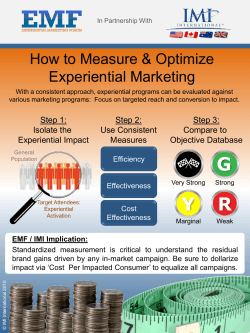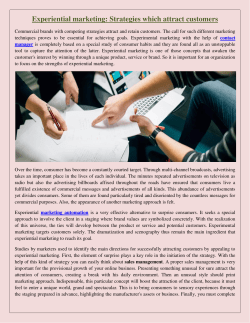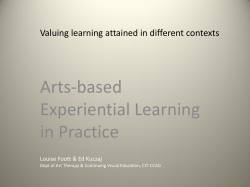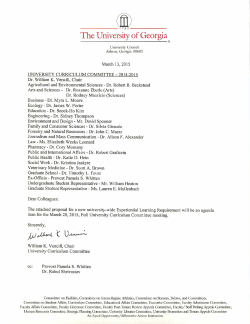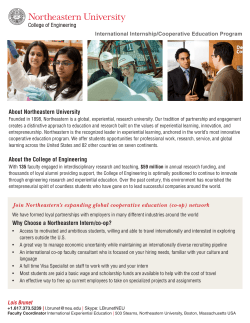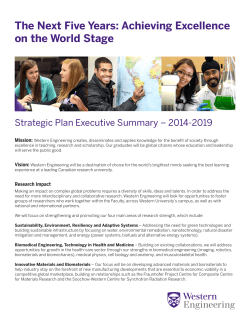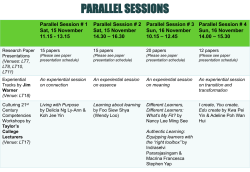
RISE Curriculum Development Grant
RISE to the IUPUI Challenge Curriculum Development Grant RFP Submission Deadline – February 6, 2015 for Summer 2015 Grant Support The RISE to the IUPUI Challenge initiative engages students more deeply in their learning and contributes to their intellectual and professional development in unique ways. Each undergraduate student is challenged to include at least two of the four RISE experiences – research, international, service learning and experiential learning - into their degree programs. Purpose Executive Vice Chancellor Nasser Paydar is committed to increasing course offerings that respond to the RISE to the IUPUI Challenge. Faculty are encouraged to apply for $2500 for professional development/summer support to develop a new course or redesign an existing course in line with RISE criteria. $2000 will be disseminated initially and the remaining $500 upon submission of the final report. RISE courses must incorporate qualified experiences, integration of knowledge, structured reflection activities to link the experience with targeted learning outcomes, and assessment as outlined below. These courses will be distinctive because they intentionally use experiential learning to prepare students for graduate school, careers, and global citizenship. They provide skills, knowledge, and experiences that are highly valued by employers and lay the foundation for future leaders. Courses developed in the summer of 2015 must initially be offered in the 2015-16 academic year. Who May Apply Full-time faculty members (including full-time lecturers) from all academic units at IUPUI are welcome to apply. Support of department Chair or Dean must be demonstrated in application materials. RISE Criteria In order for a course to qualify for RISE course development funds, it must include the following elements: 1. Qualified experiences: Students must engage in directed, first-hand immersive experiences in the “real world”, laboratory, or studio that are appropriate to the educational goals of the course and that occur beyond a normal classroom or on-line format. The purposes of these experiential learning opportunities are: 1) to apply, practice, or test concepts, methods, and skills learned in the classroom; and 2) to develop new knowledge through original research or dialogue with others in community-based or international settings. In this process students will discern how contextual nuances change the dynamics of a learning situation and recast abstract theory. They will also gain knowledge of how to learn from experience and appreciate multiple sources of wisdom. These qualified experiences must fall under one of the four areas of RISE described below. 1 2. Integration of knowledge: Students must be provided with an intellectual framework that enables them to integrate knowledge with application, and theory with real world experiences. The concepts, theories and information that constitute the course learning objectives must be purposefully integrated with the experiential learning opportunities so as to integrate abstract learning with real world situations, independent research, and/or artistic production. Selected PULs relevant to the course must become “real” to students through their assignments and experiences within the course. 3. Reflection: Students must engage in critical analysis and structured reflection about the meaning of the experiential learning in the context of the course objectives, professional and personal development, and the PULs. Typically, some, but not all reflection activities are integrated as assignments within the course. The course must require, foster, and evaluate such reflection, which may cover any or all of the following domains: i. Personal growth, ii. Academic and professional development, iii. Civic learning, ethical judgment or social responsibility. 4. Assessment: The course must have a clear plan of assessment, both of student learning and the effectiveness of the experiential learning component of the course. Students must be appraised in relation to the learning objectives for the course as a whole, the learning objectives identified for the experiential learning component of the course, and the relevant PULs. Four Areas of RISE Undergraduate Research Experience Courses o To qualify under this area of RISE, courses must generally involve students in conducting research or artistic work under the mentorship of a faculty member. o Undergraduate research experience courses may include any scholarly or artistic activities that lead: to the production of new knowledge; to increased problem solving capabilities, including design and analysis; to original critical or historical theory and interpretation; or to the production of original works of art or artistic performances. The RISE research requirement will not be met by courses that teach about research. o Those interested in creating a RISE Undergraduate Research Experience Course should contact the Center for Research and Learning (CRL) at 274-2590 to learn about more specifics that will assist in course development in this area. 2 International Experience (Study Abroad) Courses o To qualify under this area of RISE, courses must involve travel and learning outside the U.S. as well as guided reflection on the cross-cultural elements of the experience. o International Experience Courses may occur as part of IUPUI study abroad programs, approved study abroad programs by other U.S. institutions, or approved programs at overseas institutions. Independent study courses abroad are also eligible. Courses may be in any subject, as long as they include an experiential element (e.g., significant interaction with the host community, guided research, service learning or workplace/community experience), and require reflection activities or assignments that leads to enhanced skills of international understanding and interaction, both generally and with respect to the particular discipline or profession reflected in the course. o Those interested in creating a RISE International Experience (Study Abroad) Course should contact Stephanie Leslie, slleslie@iupui.edu, the Office of International Affairs, at 274-7000 to learn about more specifics that will assist in course development in this area. Service Learning Courses o Service learning is a course or competency based, credit-bearing educational experience in which students a) participate in mutually identified service activities that benefits the community, and b) reflect on the service activity in such a way as to gain a further understanding of course/academic content, a broader appreciation of the discipline, and an enhanced sense of personal/professional values and civic responsibility. Additional information regarding the qualifying experience [“service” activity]: The activity may be associated with domestic or international community groups [for example, International Service Learning Programs]. The activity may extend beyond direct service [e.g. tutoring, planting trees] to other “service” activities such as faculty mentored research, pre-professional projects, and creative products [for example, community-based participatory action research projects, civic internships, practica]. o Those interested in creating a RISE Service Learning Course should contact Mary Price, price6@iupui.edu, the Center for Service and Learning, at 278-2539 to learn about more specifics that will assist in course development in this area. Experiential Learning Courses (experiences in work and community settings) o To qualify under this area of RISE, courses must involve students in community-based, prepractice experiences, including but not limited to internships, practica, co-ops, field experiences, or other clinical experiences under the mentorship of a faculty member. 3 o Experiential Learning Courses include community-based professional practice activities that lead to the acquisition, production, integration, and/or application of knowledge; to increased problem-solving capabilities and decision-making skills; to enhanced communication skills; and to professional growth in and increased knowledge of the field of practice. The Experiential Learning Course requirement will not be met by courses that teach about career skills. Rather, it will be met by credit-bearing professional practice-based educational experiences that involve students in application of knowledge to a community problem or in a community setting under the mentorship of a faculty member that students make the desired connections. o Courses with significant use of any of the following instruction formats may qualify: Clinical Education Cooperative Education Field Work Internship Practicum Student Teaching Mentoring Practice Other categories (to be determined by academic units) o Those interested in creating an Experiential Learning Course in RISE should contact the Center for Teaching and Learning at 274-1300 to learn about more specifics that will assist in course development in this area. Procedure Electronic applications (Word or PDF), including a completed form (below) and a letter of support from your department chair or dean, must be submitted by 5:00 pm on February 6, 2015. Submit your work to Heather Carson (hacarson@iupui.edu). All applications will be reviewed and scored by the RISE Steering Committee and award notification will be made by April 3, 2015. Please note that grant recipients will be expected to complete a report to be submitted to the RISE Steering Committee. Recipients will also be expected to present on the work conducted to either the RISE Advisory Committee, or at an organized forum such as a local, regional, or national conference/workshop/symposium. All reports will be added to the RISE website as a useful resource for other faculty interested in applying for the grant. Recipients may be called upon to help review future grant proposals or serve as mentors to others who apply. Please direct questions and concerns to: Dr. Jennifer Thorington Springer, jtspring@iupui.edu. For additional information regarding the RISE initiative, please visit the RISE homepage at go.iupui.edu/rise. 4 RISE to the IUPUI Challenge Curriculum Development Grant RFP Faculty Application 2015 I. Applicant Information Section First Name: Last Name: Email: Work Phone: Department: School: II. Faculty Profile Section A current CV should be submitted with together with the application. In addition, provide a brief description of relevant experience (e.g., experiences with facilitating experiential learning) that enhances qualifications for successfully completing the proposed work. III. Department/School Support RISE to the IUPUI Challenge Curriculum Development Grant applications must include a letter of support from the relevant department chair or dean. This letter should clearly demonstrate support for program participation, commitment to include the RISE course in the curriculum, and verification of summer release time (where needed) with the understanding that time would be used for course development. IV. Proposal Section A. Abstract - Describe the project (200 - 250 words) B. Description of the course and the RISE area to be developed in the course. a. Course Name b. Course Number c. Official Course Description d. Average enrollment in course per semester (include all applicable sections) e. If applicable, how many sections will RISE course development impact? f. Targeted area of RISE i. Specific student experiences planned ii. Description of the reflection activities to be used within the course iii. How the experiential component will be integrated into the course content. C. How will the course redesign be of significance to the department and/or the campus RISE initiative? (200 words) 5 D. Outline the goals, activities, and timeline for completing the project (250 words). When will the redesigned course be offered? How often will it be offered? E. What student learning outcomes are intended for this course? Include learning outcomes related to key Principles of Undergraduate Learning appropriate to the course. How does the experiential learning relate to these PUL’s? F. Outline how student learning, including the PULs will be assessed in the course. (200 words) G. Describe how the effectiveness of the RISE portion of the course will be assessed and the means by which the results of the assessment activities will inform future practice. (200 words) H. Discuss your plan for disseminating what is learned locally, regionally, or nationally through presentations or publications. (200 words/1000 characters max) 6
© Copyright 2025
